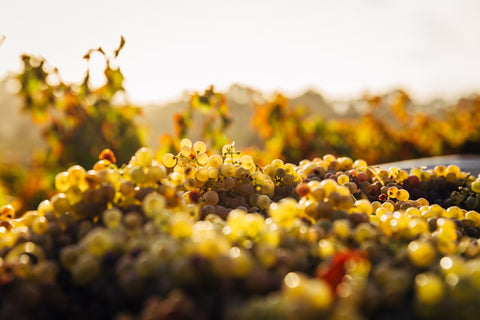McLaren Vale, a renowned wine region south of Adelaide in South Australia, boasts a unique combination of climatic and geographical factors that profoundly influence the character of its wines.
This article explores how McLaren Vale's climate, encompassing its distinct seasons, weather patterns, and soil composition, shapes the taste profiles of both its celebrated red wines and increasingly impressive white wines.
The Rhythm of the Seasons: A Mediterranean Influence
McLaren Vale enjoys a Mediterranean climate, characterised by warm, dry summers and mild, wet winters. This seasonal rhythm plays a crucial role in the grapevine's annual cycle.
-
Warm, Dry Summers: The warm, dry summers provide optimal conditions for grape ripening. Abundant sunshine ensures consistent sugar development, leading to rich fruit flavours and full-bodied wines. The dryness minimises disease pressure, reducing the need for extensive intervention in the vineyard.
-
Mild, Wet Winters: The mild, wet winters replenish soil moisture, essential for the vines to survive the dry summer months. This winter rainfall is crucial for maintaining soil health and supporting vine vigour.
-
Spring and Autumn: The moderate spring and autumn temperatures allow for a gradual transition between the extremes of summer and winter, promoting balanced vine growth and fruit development. Spring warmth encourages budburst and flowering, while autumn's cooler temperatures help retain acidity in the grapes as they ripen.
Weather's Whims: Impact on Vintage Variation
While the overall climate is Mediterranean, McLaren Vale's weather can exhibit vintage variation, influencing the specific characteristics of each year's wines.
-
Heatwaves: Occasional heatwaves during summer can accelerate ripening, leading to wines with higher alcohol levels and more concentrated flavours. However, careful vineyard management is essential to prevent overripe or raisined fruit.
-
Rainfall During Harvest: Rain during the harvest period can pose challenges, potentially diluting flavours or increasing the risk of rot. Skilled winemakers must adapt their techniques to manage these conditions effectively.
-
Cooler Years: In cooler years, ripening may be slower, resulting in wines with brighter acidity and more elegant fruit profiles. These vintage variations contribute to the diversity and complexity of McLaren Vale wines.
-
Proximity to the Coast: McLaren Vale's proximity to the Gulf St Vincent moderates temperatures, particularly in the warmer months. Sea breezes help to cool the vineyards, preventing excessive heat stress and preserving acidity in the grapes. This cooling influence is particularly important for the region's white varieties.
The Soil's Story: A Mosaic of Terroir
McLaren Vale's soils are diverse, contributing to the unique terroir of the region and the complexity of its wines.
Variety of Soil Types: The region features a mosaic of soil types, including:
-
Red-brown Earths: These clay-rich soils retain moisture well, beneficial for dry-grown viticulture.
-
Sandy Soils: These soils drain freely, leading to lighter-bodied wines.
-
Limestone: Limestone soils contribute to acidity and minerality in the wines.
-
Dark Clays: These fertile soils support vigorous vine growth.
Influence on Wine Style: The diverse soil types contribute to the distinct characteristics of wines grown in different sub-regions within McLaren Vale. For example, wines grown on limestone soils may exhibit a different minerality compared to those grown on red-brown earths.
Red Wine Character: McLaren Vale's Signature
McLaren Vale is particularly renowned for its robust and flavourful red wines.
Shiraz: Shiraz is the region's flagship variety, producing wines with:
-
Rich, dark fruit flavours (blackberry, plum).
-
Spicy notes (pepper, liquorice).
-
Full body and firm tannins.
-
The warm climate contributes to the concentration of flavours and the development of ripe tannins.
Grenache: Grenache thrives in McLaren Vale's warm climate, yielding wines with:
-
Red fruit flavours (raspberry, strawberry).
-
Spicy and floral notes.
-
Softer tannins and a medium body.
-
Old vine Grenache can produce wines of exceptional complexity and concentration.
Other Red Varieties: Other red varieties, such as Cabernet Sauvignon and Mataro (Mourvèdre), also perform well in McLaren Vale, contributing to the region's diverse red wine portfolio.
White Wine Evolution: A Growing Reputation
While traditionally known for reds, McLaren Vale is increasingly gaining recognition for its high-quality white wines.
Mediterranean White Varieties: The warm climate is well-suited to Mediterranean white varieties, such as:
-
Fiano: This Italian variety produces aromatic wines with citrus and nutty notes.
-
Vermentino: This variety yields crisp, refreshing wines with citrus and saline notes.
-
These varieties retain acidity and freshness in the warm climate.
Traditional White Varieties: Traditional white varieties, such as Chardonnay and Sauvignon Blanc, are also grown in McLaren Vale, producing wines with:
-
Concentrated fruit flavours.
-
Balanced acidity.
-
Winemaking techniques, such as lees stirring, can add complexity and texture.
Key Features:
-
Mediterranean climate with warm, dry summers and mild, wet winters.
-
Vintage variation influenced by heatwaves, rainfall, and proximity to the coast.
-
Diverse soil types contributing to regional complexity.
-
Shiraz is the flagship red variety, known for rich fruit and spice.
-
Growing reputation for Mediterranean white varieties like Fiano and Vermentino.
-
A combination of climate, soil, and skilled winemaking shapes the unique character of McLaren Vale wines.
FAQ's:
Q: What is the climate of McLaren Vale?
A: Mediterranean, with warm, dry summers and mild, wet winters.
Q: What is McLaren Vale best known for?
A: Traditionally, robust and flavourful red wines, particularly Shiraz.
Q: What type of soil is common in McLaren Vale?
A: A variety, including red-brown earths, sandy soils, limestone, and dark clays.
Q: How does the climate influence the red wines?
A: Warm climate leads to rich fruit, spice, full body, and ripe tannins.
Q: What white wine varieties are grown in McLaren Vale?
A: Mediterranean varieties like Fiano and Vermentino, and traditional varieties like Chardonnay and Sauvignon Blanc.




Comments (0)
There are no comments for this article. Be the first one to leave a message!